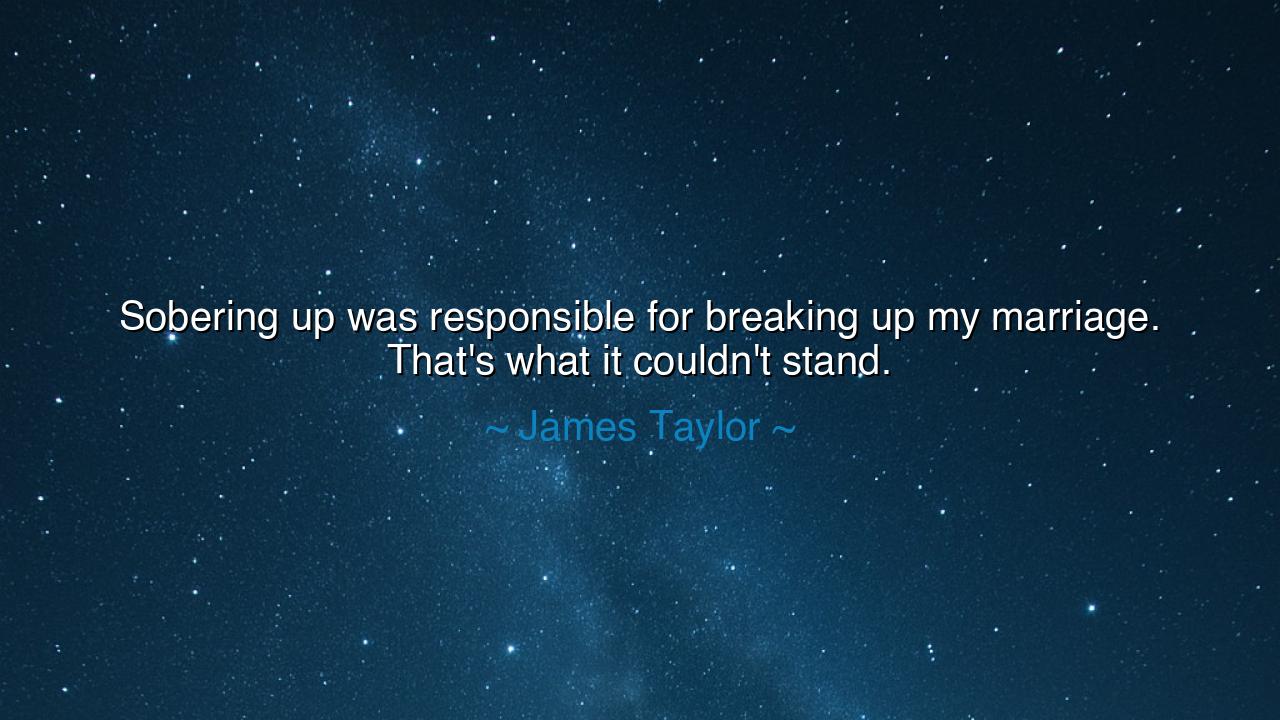
Sobering up was responsible for breaking up my marriage. That's
Sobering up was responsible for breaking up my marriage. That's what it couldn't stand.






In the vast expanse of human experience, there are few struggles more profound than the battle between addiction and self-realization. James Taylor’s words, “Sobering up was responsible for breaking up my marriage. That's what it couldn't stand,” carry within them the heavy weight of personal transformation and the pain that often accompanies growth. Sobriety, a journey toward clarity and self-awareness, can be both a healing process and a force of rupture. Taylor’s reflection speaks to the complexity of human relationships, where one individual’s effort to change can sometimes reveal that the very foundation of a partnership was built on fragile grounds.
In the ancient world, the Greeks understood the tension between self-discipline and the forces that pull us away from it. Homer’s Iliad speaks of Achilles, a hero whose great strength was also his greatest flaw. In his rage, Achilles would often act impulsively, allowing emotions and desires to control his actions. It was only through his moment of reflection—his sobriety from anger—that he began to see the consequences of his choices. Yet, even when he changed, his relationships, particularly with Agamemnon, were strained, revealing that personal growth does not always lead to harmony. Taylor’s own struggle mirrors this ancient truth: the effort to reclaim clarity and sobriety can expose the cracks in relationships that were once held together by dependency or avoidance.
The ancients also recognized that addiction, in all its forms, could be a form of escape from reality—a way to numb the soul from the pain of truth. Consider the story of Odysseus, whose journey back home was fraught with temptations that sought to pull him away from his true self. One of the most powerful temptations was the land of the Lotus-Eaters, where the inhabitants consumed the lotus plant, losing their memories and their sense of purpose. For Odysseus and his men, the lotus symbolized the danger of surrendering to temporary pleasures, a numbing of the soul that prevents one from facing the harsh truths of life. Taylor’s sobriety echoed this theme—by choosing to face the difficult truths, he disrupted the illusion that had once sustained his marriage.
Sobriety, however, does not only reveal the cracks in our relationships—it can also illuminate the strength needed to rebuild them. The journey toward self-awareness, though painful, offers the possibility of growth and renewal. King Solomon in his wisdom spoke of healing through introspection, declaring in the Book of Proverbs, “The healing of the soul comes through wisdom, and the breaking of relationships reveals where wisdom is lacking.” In this sense, Taylor’s reflection on the breakdown of his marriage serves not as a defeat, but as a painful moment of clarity—a moment where the true nature of his relationship was revealed. Sobriety, in this context, becomes a means of truth, a way to see not only oneself more clearly but also the dynamics that were once hidden beneath the surface.
Yet, the ancient wisdom tells us that relationships, especially those founded on unacknowledged struggles, are delicate. Plato, in his dialogues, often spoke of balance as the key to a harmonious life. The relationships that endure are those that find a way to adapt and evolve together. The universe—whether we turn to the teachings of the Greeks or the wisdom of Eastern philosophy—shows us that change and growth are the natural rhythms of life. When Taylor chose to sober up, he was making an attempt to align himself with the truth of who he was. However, his marriage, bound by habits of co-dependency and perhaps avoidance, could not weather the storm of that change. It became clear that sobriety had revealed deeper issues, ones that required both partners to evolve together, not just one.
The lesson from Taylor's story, drawn from the wisdom of the ancients, is one of self-awareness and transformation. Growth, while often painful, is a necessary part of life, and it demands courage to face both the self and the relationships that shape us. However, true growth is not always easy for those who are invested in the old ways. Just as Achilles had to reconcile his anger with his honor, Taylor had to reconcile his sobriety with the fragile structure of his marriage. It is a reminder that healing begins within, but it often requires a shift in relationships that can be difficult and disruptive.
In our own lives, let us learn from Taylor’s reflection. If we seek to change and grow, we must be prepared for the repercussions of those changes. Sobriety, whether from substances, anger, or unhealthy patterns, is not merely an individual journey—it is a journey that impacts everyone in our sphere. As we pursue self-awareness and truth, we must also be prepared to face the reality that not all relationships are ready to endure the transformation we seek. Let us approach these moments with compassion, patience, and a willingness to evolve, knowing that true healing is not only about reclaiming our individuality but about fostering relationships that can grow alongside our own evolution.






AAdministratorAdministrator
Welcome, honored guests. Please leave a comment, we will respond soon